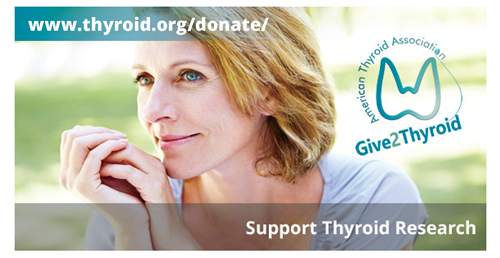Clinical Thyroidology for the Public summarizes selected research studies discussed in the previous month’s issue of Clinical Thyroidology, an official publication of the American Thyroid Association. Editor-in-chief, Alan Farwell, MD, FACE
Volume 12 Issue 7
Available in pdf format for saving and printing and Web page format for viewing online
PDF Format for Saving and Printing
Clinical Thyroidology for the Public Volume 12 Issue 7 (PDF file, 6 MB)
TABLE OF CONTENTS – Web Format
IN MEMORIAM
Lewis E. Braverman, MD, MACE, MACP
(PDF File for saving and printing, 304 KB)
GUEST BLOG FROM THE IODINE GLOBAL NETWORK
Timing matters for healthy iodine nutrition in the development of verbal IQ in babies during pregnancy.
Levie D et al. Association of maternal iodine status with child IQ: a meta-analysis of individual-participant data. J Clin Endocrinol Metab. Epub 2019 Mar 28. PMID: 30920622
(PDF File for saving and printing, 282 KB)
HYPERTHYROIDISM Antithyroid drug–induced agranulocytosis is about 10-fold more common in amiodaroneinduced thyrotoxicosis than in thyrotoxicosis due to other causes
The most severe side effect of antithyroid drugs is agranulocytosis, a rare side effect that causes an increased risk of developing a serious infection. The researchers performed this study to compare the risk of antithyroid drug-associated agranulocytosis in amiodarone-induced thyrotoxicosis patients with those who had thyrotoxicosis from other causes.
Gershinsky M et al 2019 Increased risk of antithyroid drug agranulocytosis associated with amiodarone-induced thyrotoxicosis: a population-based cohort study. Thyroid 29:193–201. PMID: 30648930.
(PDF File for saving and printing, 282 KB)
HYPOTHYROIDISM Thyroid surgery for patients with Hashimoto’s disease
Hashimoto’s thyroiditis is an autoimmune disorder where antibodies attack and destroy the thyroid. In some patients, symptoms may persist despite what appears to be adequate treatment based on blood tests of thyroid function, raising the possibility that some symptoms may be related to the autoimmune condition itself. This study examines the effect of thyroidectomy (to decrease thyroid antibody levels) compared to medical therapy for symptomatic hypothyroid patients with Hashimoto’s thyroiditis despite achieving normal thyroid hormone levels after adequate thyroid hormone replacement.
Guldvog I et al Thyroidectomy versus medical management of euthyroid patients with Hashimoto’s Disease and Persistent Symptoms: a randomized trial. Compared to Adequate Thyroid Hormone Replacement 2019 Annals of Internal Medicine. Epub 2019 Mar 12. PMID: 30856652. THYROID CANCER 10
(PDF File for saving and printing, 447 KB)
THYROID CANCER Are NIFTP tumors truly benign?
Outcomes for the encapsulated follicular variant papillary thyroid carcinoma are particularly good and some feel is a benign tumor and renamed this NIFTP. However, the long-term effects of reclassifying this tumor have not been thoroughly studied. In the current study the authors reviewed thyroid cancer cases within a large tertiary care center to characterize the incidence of NIFTP tumors and to determine whether it is truly a benign tumor.
Parente DN et al 2018 Clinical safety of renaming encapsulated follicular variant of papillary thyroid carcinoma: is NIFTP truly benign? World J Surg 42:321–326. PMID: 28828746.xidase Antibody and/or Thyroglobulin Antibody Positivity Conditions During the First Half of Pregnancy. Thyroid 29(4):577-585
(PDF File for saving and printing, 561 KB)
HYPERTHYROIDISM Thyroid antibody levels may not predict thyroid hormone levels and risk of recurrence in older patients with Graves’ disease
Graves’ disease can be treated with antithyroid drugs as a long term treatment to cause the Graves’ disease to go into remission. Once the antithyroid drugs are stopped, there can be anywhere from a 5-90% risk of relapse of the Graves’ disease. This study was done to study possible association between the level of TRAb at diagnosis of Graves’ disease and severity of hyperthyroidism and risk of recurrence after stopping antithyroid drug treatment.
Bano A et al 2019 Age May Influence the Impact of TRAbs on Thyroid Function and Relapse-Risk in Patients with Graves Disease. J Clin Endocrinol Metab 104(5):1378-1385.
(PDF File for saving and printing, 278 KB)






